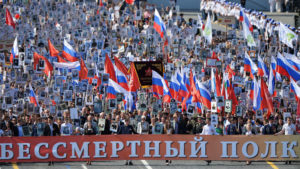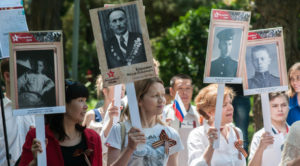
EDITOR'S CHOICE | 10.12.2016
A New Cold War or a New Detente
Gilbert Doctorow
The U.S. presidential election presented the American voting public with a clear choice on the issue of the New Cold War with Russia, between worsening tensions and a chance for détente.
Hillary Clinton offered a continuation and intensification of the policies of isolation, denigration and confrontation with Russia that President Obama has pursued over the past three years, bringing us closer to nuclear war. Donald Trump favored a policy of outreach to Russia, initially focused on a common struggle against Islamic State and Al Qaeda terrorism, but having the potential to mature into a broad constructive relationship.
Some of the estimated 12 million Russians who took part in Immortal Regiment parades across the country over three days in May 2016. (RT photo)
But the reality is that the foreign policy dimension of the votes cast on Nov. 8 was always going to be relatively minor, given Americans’ natural focus on domestic issues. And this year the whole electoral race was muddied by the vicious character assassinations practiced by both Republican and Democratic candidates.
In the op-ed article published below, which first appeared in The Nation, my fellow co-authors bring to the attention of a target audience of Americans interested in world affairs an opportunity to take a stand and “cast a vote” for peace that can materially affect the changing political landscape of Europe in 2017, where there will be nationwide elections in the locomotive nations of the European Union: France and Germany.
To be sure, as a result of the primary elections two weeks ago within the Center-Right party that bears the Gaullist traditions, the Republicans, and has the greatest likelihood of winning the Presidency in April-May 2017, the French appear to be choosing the more peaceful course on their own. They are rejecting Cold War rhetoric in favor of re-building ties to Russia.
However, in Germany, the candidate favored to win a fourth term in office in the autumn national elections, Chancellor Angela Merkel, considers herself the heir to Barack Obama’s “legacy” of belligerence towards Russia. At the Christian Democratic Union (CDU) party convention in Essen on Dec. 6, she was re-elected as standard-bearer of her party with some 98 percent of the votes.
In this context, it is important that within Germany’s Socialist Party (SPD), which presently is Merkel’s coalition partner but will be competing against her in the federal elections next autumn and which keeps alive the memory of Germany’s own détente policy towards Russia, has now stepped out into the political arena and is gathering support from politicians both inside the SPD and in other parties to seek a change of direction with respect to Russia.
Where do Americans potentially fit into this equation? It would be no exaggeration to say that the Obama administration had a decisive role in scripting Angela Merkel’s shift from a policy of strategic partnership with Russia in 2008 to Cold War venom in 2016. Vice President Joe Biden boasted openly of the pressure the U.S. applied to achieve and maintain the sanctions against Russia in the European Union for which Germany was instrumental.
For these reasons, American citizens and organizations representing civil society should have no complexes about “influencing” the forthcoming German elections by demonstrating to their fellow-thinkers in the SPD and across the German political spectrum that the U.S. government did not speak for the American people when it imposed Cold War rules on the German chancellor and her backers in the ruling elites.
On the contrary, showing to German society that a peaceful Atlanticism is also possible and desirable, Americans could right the wrongs of the recent past. For those who wish to support this position, you can support the German pro-détente movement by signing the appeal:
The following is a position paper, “Détente Now: A New Call for Peace, Security, and Cooperation,” by Gilbert Doctorow, Ute Finckh-Krämer, Ludger Volmer, Rolf Ekéus and Noam Chomsky
A transatlantic appeal for a new policy of détente with Russia has been launched. The declaration’s authors invite the general public to join leading political figures and social activists who have publicly rallied to support the call.
The initiative was born in Berlin several months ago in the days of deepest gloom engendered by confrontation with Russia over Ukraine, the Baltic countries, and Syria, with major war exercises held around Russia’s borders and bellicose language from both sides that suggested imminent hot war. As German Minister of Foreign Affairs Frank Walter Steinmeier (SPD) said in an interview with Bild newspaper on October 8, present times are more dangerous even than during the Cold War that ended in 1990: “Previously, the world was divided, but Moscow and Washington knew each other’s red lines and respected them. In a world with many regional conflicts and dwindling influence of the great powers, the world becomes more unpredictable.”
The roll-out of the initiative called Détente Now aims at bringing civil society on two continents into play both to enforce and to support approaches to pursue dialogue and compromise with Russian counterparts, e.g., on confidence- and security-building measures between Russia and its neighbors. Détente Now will be a powerful voice for change of direction in foreign policy within Europe, and within Germany in particular, as it and several other key EU countries have their national elections in the course of 2017.
In the United States, the word “détente” brings to mind the efforts of former presidents and secretaries of state to control and reduce strategic weapons and to find ways of cooperation instead of confrontation. In Germany, the equivalent policy, Entspannungspolitik, was crafted in the 1970s by Chancellor Willy Brandt and his close adviser Egon Bahr. Their “Eastern Policy” promoted rapprochement as a means of gradually changing the behavior and views of the opposing side. It is widely believed to have facilitated the eventual fall of the Berlin Wall and end of the original Cold War.
The Détente Now declaration specifically seeks implementation of the twin objectives of a “Europe whole and free” and a common space of peace and security extending from Lisbon to Vladivostok. That vision of all-European security set out in the Charter of Paris signed in 1990 by all European states and the institutionalization of the Organization for Security and Cooperation in Europe in Budapest in 1994, was predicated upon respect for human rights and liberties, and upon equal security provisions for all. Regrettably, in the 1990s this grand vision was replaced by political and security schemes that left Russia out in the cold: the greater European Union and an expanded NATO. The result has been nearly calamitous, the authors of Détente Now believe.
The declaration was initiated by a few concerned citizens of civil society, churches, and science, including Wolfgang Biermann (former adviser to Egon Bahr), Peter Brandt (historian), Konrad Raiser (former secretary general of the World Council of Churches), Reiner Hoffmann (chairman of the German Trade Unions Federation), and Horst Teltschik, (former head of Chancellor Kohl’s office and 1999–2008 director of the Munich Security Conference), as well as, from the United States, Daniel Ellsberg (longtime advocate for an informed citizenry).
Many people from the United States, Germany, and other countries support the declaration in the wake of the American presidential election as a transatlantic appeal for a new policy of détente. Among the key first signatories in Germany are well-known Bundestag members from the SPD party, recently joined by a growing number of Green deputies, as well as city mayors, scientists, artists, and journalists. In the United States, the declaration has won the support of several board members of the American Committee for East West Accord, the Nuclear Age Peace Foundation, the Association of International Physicians for Prevention of Nuclear War, Veteran Intelligence Officials for Sanity, and of celebrities from the film and music industries, among them Roger Waters (founding member of Pink Floyd) or David Kasper (an Academy Award–winning filmmaker).
Starting this month, the declaration will be published on various homepages, and public collection of more signatures of support will start. A German version can be found here, with an English version here.
The Initiative “neue Entspannungspolitik jetzt!” / “DetenteNOW!” will open a German- and English-language portal to make available literature relevant to the cause. Supporters of the declaration also propose to organize round-table discussions both in Europe and in the United States, and to set up direct US-German-Russian and other exchanges of civil society activists who support the initiative.
Gilbert Doctorow is a professional Russia watcher going back to 1965. He is a board member and European Coordinator of the American Committee for East-West Accord.
Ute Finckh-Krämer, Member of the German Bundestag, SPD, is a Member of the Committee on Foreign Affairs and Deputy Chairperson of the Subcommittee on Arms Control and Disarmament in the German Bundestag.
Ludger Volmer was a member of the German Bundestag from 1985 to 1990 and 1994 to 2002. He was undersecretary of state from 1998 to 2002.
Rolf Ekéus of Sweden was executive chairman of the UN Special Commission on Disarming Iraq from 1991 to 1997. He chaired the drafting of the principles of the Charter of Paris in 1990, a founding document of the Organization for Security and Cooperation in Europe.
Noam Chomsky, Institute Professor emeritus at MIT, has written many books and articles on international affairs, in particular on Israel and Palestine. His latest book is Who Rules the World?


No comments:
Post a Comment